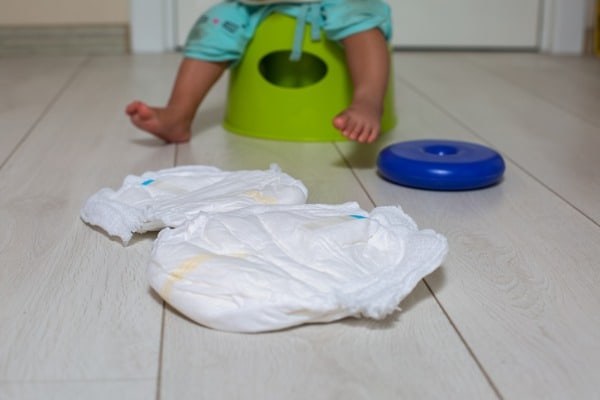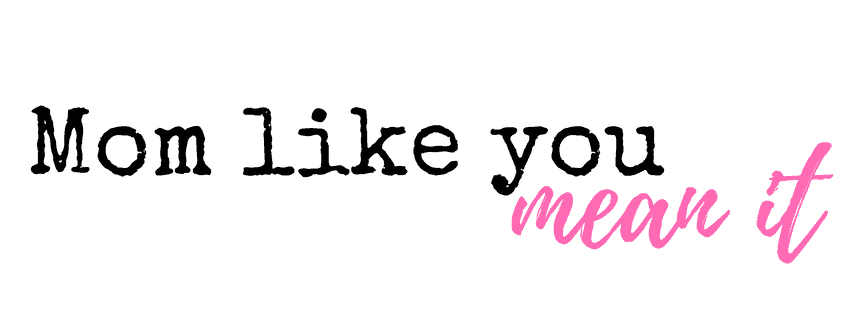By quickly scanning a few articles on the topic of potty training, you’ll quickly come to realize that there’s a wide variety of opinions on when your child should be potty trained.
In the 1950s it was common to have 18 month olds fully potty trained. Fast forward to today, and most parents follow a readiness approach, which basically allows the child to more or less lead the process when they’re ready, which is why today’s children are potty trained much later than they were decades ago.
4 Signs your child is not ready for potty training

As a certified potty training consultant, I get asked all the time, “What’s the best age to potty train my child?”
While age does factor in to potty training success, it’s just one piece of the puzzle. And you’ll soon find out that the average potty training age varies widely from kid to kid.
Below I’ll go over 4 signs your child may not be ready to potty train yet, and I’ll also give you helpful tips for how to get them ready, too.
They are too young
Bladder control is huge in terms of whether or not potty training will be successful- and of course, this control comes with age.
At 18 months, some toddlers have a just started to develop bladder control, but this really isn’t the norm. Most of the time, toddlers don’t have control over their bladder until closer to 2.
Between age two and three, the child is typically able to gain significant control over their bladder and by 3 daytime control over the bladder is usually established.
An easy way to tell what your child’s bladder control is like is to observe how long they’re keeping their diapers dry. Are they waking up from a nap with a dry diaper?
Are they keeping a dry diaper during the day for at least an hour? These indicators show that the bladder is mature enough to hold urine for a significant period of time and potty training is doable.
From age 2 to 4.5 the bladder doubles in size! All this to say, if your two year old seems ready but just can’t seem to grasp what you’re teaching her, she might not be ready, biologically.
They don’t understand yet
Does your child know when they pee or poop? Have they shown any curiosity in your bathroom habits? If they seem completely oblivious to the fact that they’re going pee or poor and just the potty in general, they’re likely not quite ready for potty training.
Many kids approaching the perfect time to be potty trained will immediately want to be changed with a wet or poopy diaper.
This is a huge shift from what they have done up until this point in their life, as they were happy to play in their soiled/wet diaper without any fuss. Toddlers who are close to being ready to be potty trained will also go hide while they are pooping, almost to say, “I need some privacy.” This is another big indicator they are ready.
Sometimes language comes later for kids, and that’s okay, they don’t need to verbalize with the correct words they have just gone potty, but they need to communicate it in some other way-hand gestures, other words that are easier for them to say, etc.
They don’t follow one or two step directions
Closely related to understanding that they are peeing or pooping is the ability to follow simple directions. More often than not, the first set of directions your child learns is “no!”
This often comes as the result of baby gaining mobility and quickly moving to something that will cause them harm and so parents quickly shout, “No!” and baby stops. This typically happens around 6-9 months.
Between 15-18 months your baby has typically progressed significantly and has the ability to understand one step directions like “Point to your eyes.”
Two step directions come later and are things like “Pick up the block and put it in the basket.” If your child can follow one step directions, great! If they are routinely following two step directions, awesome!
These skills are crucial for potty training readiness, as they will need to understand basic directions like “Flush the potty,” and “Pull up your pants,” in order to succeed.
They lack the physical ability to push down and pull up their pants
Some kids would be happy for their parents to dress them indefinitely, while others are very independent and are curious to learn so they can accomplish tasks on their own. The physical independence that comes with the ability to dress oneself is huge in terms of potty training readiness.
With my first child (and before I became a certified potty training consultant) I didn’t know how important this step was in order to be successful with potty training and I had quite the time attempting to potty train her, as she was no where close to being able to push down or pull up her own pants.
Dressing by themselves is a monumental accomplishment for toddlers. Not only have they developed ample motor skills to accomplish the task, but they’ve also gained a huge independence.
If your child is not showing any signs of dressing themselves, don’t panic. You can begin today. Toddlers change clothes so many times a day, there are endless opportunities to practice this skill.
Find more articles on potty training here to help you get your toddler ready to go!

Leave a Reply